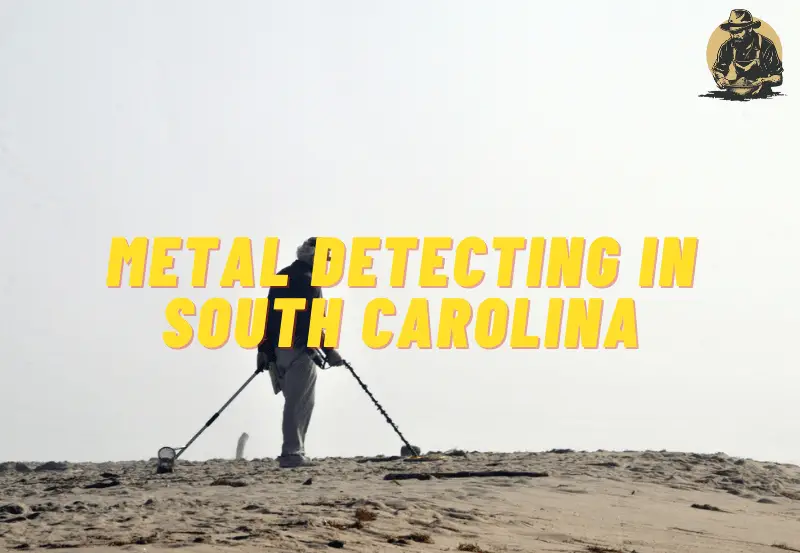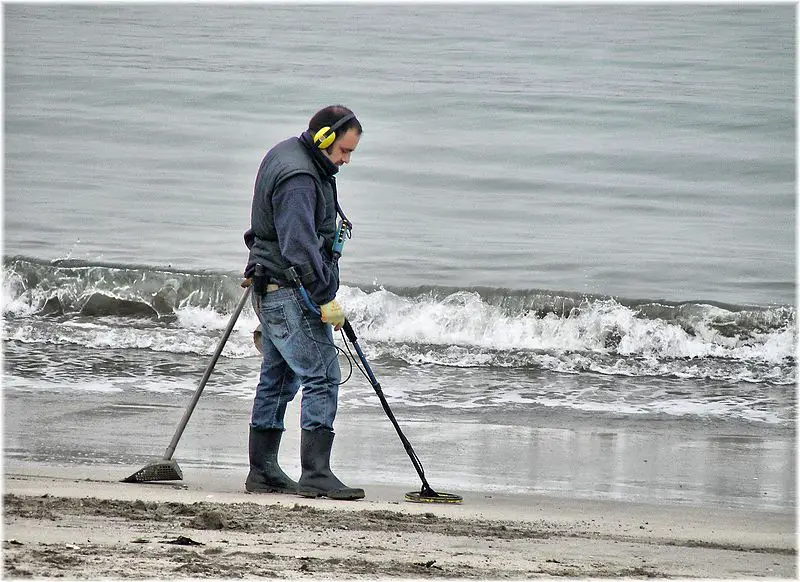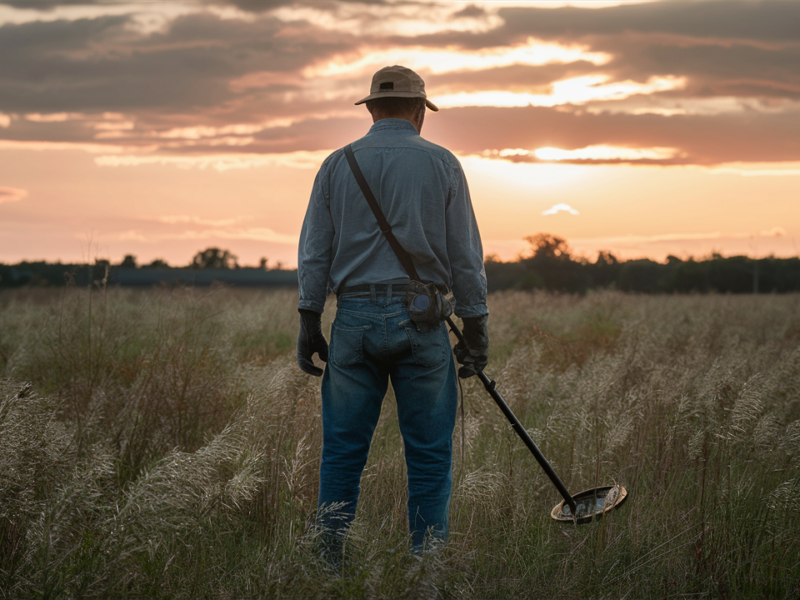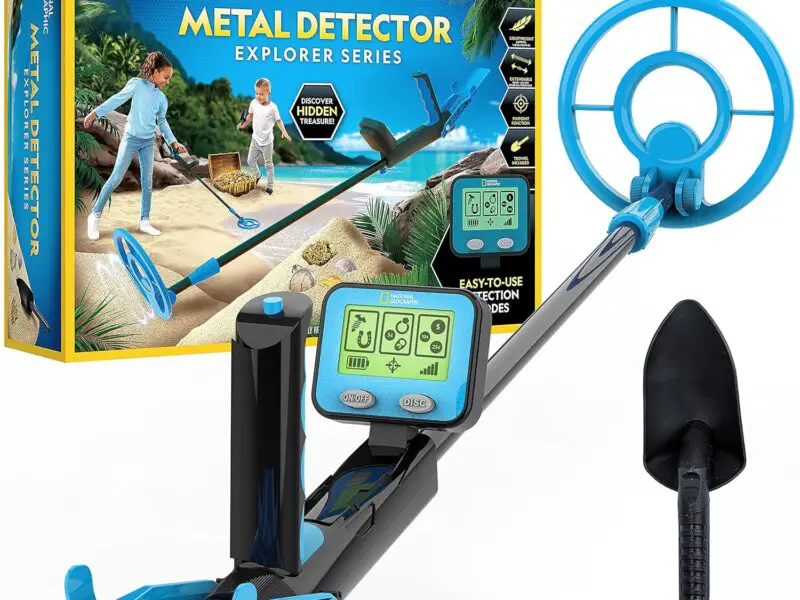Are you ready to embark on a thrilling adventure of uncovering hidden treasures in the picturesque state of South Carolina? Look no further, because the “Ultimate Guide to Metal Detecting in South Carolina” has got you covered! In this comprehensive guide, we will take you on a journey through the best spots to indulge in this exciting hobby and reveal the secrets that lie beneath the sandy beaches, historic sites, and lush parks. Whether you’re a seasoned detectorist or a novice exploring this fascinating world for the first time, get ready to unearth valuable relics, ancient coins, and forgotten artifacts as we dive into the realm of metal detecting in South Carolina.
History of Metal Detecting in South Carolina
Early uses of metal detectors
The history of metal detecting in South Carolina dates back to the early days of the technology’s invention. Metal detectors were first used in the late 19th century, primarily for military purposes such as locating landmines and unexploded ordnance. However, it didn’t take long for enthusiasts to realize the potential for uncovering hidden treasures. In South Carolina, metal detecting quickly gained popularity among hobbyists and treasure seekers, particularly due to the state’s rich history and diverse range of potential treasure sites.
Metal detecting clubs and organizations in the state
Over the years, metal detecting enthusiasts in South Carolina have formed numerous clubs and organizations to connect with like-minded individuals and share their passion for treasure hunting. These clubs provide a platform for members to exchange tips and techniques, organize group hunts, and foster a sense of camaraderie among fellow enthusiasts. Some notable metal detecting clubs in South Carolina include the South Carolina Treasure and Artifact Association, the Charleston Metal Detecting Club, and the Carolina Gold Prospectors.
Regulations and laws for metal detecting
Before embarking on your metal detecting adventure in South Carolina, it’s important to familiarize yourself with the regulations and laws governing the activity. The state of South Carolina has specific laws pertaining to metal detecting, and it is crucial to comply with these regulations to avoid any legal repercussions. Some key regulations include obtaining permission before metal detecting on private property, adhering to any local or state restrictions on archaeological or historical sites, and reporting any significant or valuable finds to the appropriate authorities. By adhering to the regulations, you can ensure a responsible and enjoyable metal detecting experience.
Preparing for a Metal Detecting Adventure
Choosing the right metal detector
The first step in preparing for a metal detecting adventure in South Carolina is selecting the right metal detector for your needs. With various models available on the market, it’s essential to choose a detector that is suited to the type of treasure hunting you intend to pursue. Factors to consider include the detector’s frequency capabilities, search coil size, and sensitivity settings. Additionally, budgetary considerations may come into play. Researching and reading reviews on different metal detectors can help you make an informed decision and invest in a detector that will enhance your overall experience.
Essential equipment and accessories
In addition to the metal detector itself, there are several essential equipment and accessories you’ll need for a successful metal detecting adventure. These include a sturdy digging tool such as a trowel or digger, a pinpointer to help locate targets more precisely, headphones to listen for faint signals, and a finds pouch or bag to safely store your discoveries. It’s also a good idea to invest in a protective carrying case for your metal detector and any additional accessories to ensure their longevity.
Researching potential treasure sites
To maximize your chances of finding hidden treasures in South Carolina, conducting thorough research on potential treasure sites is crucial. South Carolina is steeped in history, with a rich heritage that spans from Native American settlements to the Civil War era and beyond. By delving into historical records, maps, and online resources, you can identify areas where significant events occurred or where historical structures once stood. Some promising places to search include beaches and waterfront areas, quarries and abandoned mines, Civil War battlefields, ghost towns, old homesteads, parks and recreation areas, and campgrounds.

Best Spots for Metal Detecting in South Carolina
Beaches and waterfront areas
South Carolina boasts a stunning coastline, making its beaches and waterfront areas prime spots for metal detecting. Over the years, beachgoers have lost a variety of items, from jewelry and coins to personal artifacts, making these areas a treasure trove for metal detector enthusiasts. Popular beach destinations such as Myrtle Beach, Folly Beach, and Hunting Island State Park are known to yield exciting finds, particularly after storms or high tides.
Quarries and abandoned mines
Quarries and abandoned mines are often overlooked but can be excellent locations for metal detecting in South Carolina. These areas may have been utilized for various purposes throughout history and can yield valuable relics or minerals. Remember to obtain any necessary permissions before exploring these sites, as some may be privately owned or restricted due to safety concerns.
Civil War battlefields
Given South Carolina’s pivotal role in the Civil War, its battlefields hold immense historical significance. Metal detecting on Civil War battlefields provides an opportunity to unearth artifacts and relics related to this tumultuous period in American history. However, it’s important to check local regulations and obtain any required permissions, as some battlefields may have restrictions to protect archaeological integrity.
Ghost towns and old homesteads
South Carolina is home to several ghost towns and abandoned homesteads, which can be intriguing places to explore with a metal detector. These areas may yield remnants of past lives, including coins, household items, and fragments of forgotten history. Researching the histories of ghost towns and old homesteads can help you narrow down potential areas to search, increasing your chances of making exciting discoveries.
Parks and recreation areas
South Carolina is teeming with parks and recreation areas, offering ample opportunities for outdoor enthusiasts and metal detectorists alike. These sites are frequented by locals and tourists, making them prime locations for finding lost jewelry, coins, and other items. Be sure to respect any park rules or regulations and obtain necessary permissions, especially if the area is considered to be of historical or archaeological significance.
Campgrounds and picnic sites
Metal detecting in campgrounds and picnic sites can be both enjoyable and rewarding. Many individuals unknowingly lose items such as jewelry, keys, and coins while enjoying time with family and friends. By utilizing your metal detector in these areas, you may have the chance to uncover forgotten treasures that carry sentimental value for their owners. Again, it is essential to obtain any necessary permissions before conducting metal detecting activities in these locations.
Techniques and Tips for Metal Detecting
Understanding metal detector settings
To make the most of your metal detecting experience, it’s essential to familiarize yourself with your detector’s settings. Understanding the different settings, such as discrimination, sensitivity, and ground balance, can help you fine-tune your detector to target specific types of metals and minimize unwanted signals. Consult your detector’s user manual or online resources to learn about the optimal settings for the terrain and items you are searching for.
Proper coil sweeping techniques
Coil sweeping technique is crucial for maximizing the efficiency of your metal detector. It involves swinging the detector’s coil back and forth in a smooth and controlled manner over the ground, covering the maximum surface area while maintaining a steady pace. Avoid swinging the coil too quickly, as this can result in missing potential targets. Experimenting with different sweeping techniques, such as overlapping or grid patterns, can help increase your chances of finding hidden treasures.
Recognizing different types of signals
Each metal detector emits various types of signals to indicate the presence of different types of metals. Learning to recognize and interpret these signals is vital in distinguishing between valuable finds and common metal artifacts. By using the discrimination feature, you can filter out signals from unwanted metals like iron or aluminum and focus on signals indicating potentially valuable targets. Practice and experience will improve your ability to identify different types of signals accurately.
Digging and retrieving targets
When your metal detector alerts you to a potential target, it’s time to put your digging skills to use. Using a digger or trowel, carefully excavate the area around the target, ensuring not to damage any potential finds. Remember to fill any holes you dig responsibly, leaving the area as you found it. Digging in accordance with Leave No Trace principles helps preserve the natural environment and ensures the continued enjoyment of metal detecting for everyone.
Identifying common metal artifacts vs valuable finds
One of the challenges every metal detector enthusiast faces is distinguishing between common metal artifacts and valuable finds. Certain items, such as bottle caps, pull tabs, and nails, can produce similar signals to more valuable targets like coins or jewelry. A discriminating metal detector can help filter out these unwanted signals to some extent. However, experience and knowledge of different types of artifacts will greatly aid in quickly identifying and assessing the value of your finds.
Preserving and Displaying Your Finds
Cleaning methods for different materials
Once you’ve made exciting discoveries with your metal detector, preserving and cleaning your finds is essential to maintain their condition and value. Different materials require specific cleaning methods to avoid causing damage. For example, coins may require gentle rinsing with water and mild soap, while delicate jewelry should be cleaned with a soft brush and jewelry cleaner. Research the proper cleaning techniques for different types of artifacts and exercise caution to prevent any harm during the cleaning process.
Conservation and restoration techniques
In some instances, you may come across artifacts that require conservation or restoration to preserve their integrity. This could include stabilizing corroded metals, repairing fragile objects, or treating items with special coatings to protect them from further deterioration. It is advisable to seek guidance from conservators or experts in the field to ensure proper conservation techniques are followed, especially if the find holds historical or archaeological significance.
Using digital tools for documenting finds
In the digital age, documenting your finds has become easier and more accessible. Utilizing photography, videography, and digital note-taking tools can aid in preserving the memory of your discoveries and sharing them with others. Take clear and detailed photographs of each find, noting relevant information such as location, date, and any notable observations. Creating a digital catalog or album of your metal detecting adventures can be an excellent way to document your journey as a treasure hunter.
Display options and creating a collection
Displaying your finds can be a rewarding aspect of metal detecting. Depending on the size and nature of your discoveries, various display options are available. Small items like coins or jewelry can be showcased in a display case or shadow box, while larger items or relics can be arranged on shelves or stands. Creating a themed collection, such as coins from different eras or military artifacts, adds a personal touch to your display and provides a visual representation of your metal detecting achievements.
Safety Considerations for Metal Detecting
Seeking permission and respecting private property
One of the most important safety considerations when metal detecting in South Carolina is seeking permission and respecting private property. It is essential to obtain the landowner’s permission before conducting any metal detecting activities on private property. Trespassing without permission not only violates the law but also jeopardizes the reputation of the metal detecting community as a whole. Always ensure you are aware of the boundaries of public and private lands to avoid any legal complications.
Awareness of local wildlife and hazards
When venturing into the great outdoors for metal detecting in South Carolina, it’s crucial to be aware of the local wildlife and potential hazards. Familiarize yourself with the common wildlife species in the area and how to react in the presence of venomous snakes or other potentially dangerous animals. Additionally, be cautious of other environmental hazards such as uneven terrain, poisonous plants, or inclement weather. Staying vigilant and taking necessary precautions will contribute to a safe and enjoyable metal detecting experience.
Proper handling of equipment and tools
Metal detectors and associated tools can be potentially hazardous if not handled properly. Always follow the manufacturer’s instructions for safe operation and handling of your equipment. Avoid placing the detector or accessories near water sources or in direct sunlight for extended periods. Regularly inspect your equipment for any signs of wear or damage and replace or repair as necessary. By taking care of your equipment, you can minimize the risk of accidents and maximize the lifespan of your metal detecting gear.
Sun protection and hydration
South Carolina is known for its warm climate, especially during the summer months. When engaging in metal detecting activities, it’s important to protect yourself from the sun’s harmful rays. Wear a wide-brimmed hat, apply sunscreen to exposed skin, and stay hydrated by drinking plenty of water. It’s advisable to bring a water bottle with you during your metal detecting adventures to ensure you stay hydrated throughout the day. Pay attention to any signs of heat exhaustion or dehydration and take breaks as needed.
South Carolina’s Must-See Metal Detecting Events
South Carolina Treasure and Artifact Association annual hunt
The South Carolina Treasure and Artifact Association (SCTAA) hosts an annual hunt that brings metal detecting enthusiasts from across the state together for a weekend of fun and camaraderie. The event typically includes seeded hunts, contests, and opportunities to showcase incredible finds. Participating in the SCTAA annual hunt is a fantastic way to connect with fellow treasure hunters, learn new techniques, and potentially make exciting discoveries.
Charleston Metal Detecting Club meetings and outings
The Charleston Metal Detecting Club is another vibrant metal detecting community in South Carolina. The club organizes regular meetings and outings, providing members with opportunities to socialize, share finds, and participate in group hunts. Attending meetings and outings organized by the Charleston Metal Detecting Club is an excellent way to expand your knowledge, build relationships with experienced detectorists, and explore new areas alongside fellow enthusiasts.
Read more about Metal Detecting Clubs Across America
Carolina Gold Prospectors events
While primarily focused on gold prospecting, the Carolina Gold Prospectors also cater to metal detecting enthusiasts. The group organizes various events throughout the year, including gold panning competitions, seminars, and metal detecting outings. These events provide a unique opportunity to engage in both metal detecting and gold prospecting activities while learning from experienced prospectors and treasure hunters.
Antique and Artifact Festivals in the state
South Carolina hosts several antique and artifact festivals, which can be of great interest to metal detector enthusiasts. These festivals bring together vendors, collectors, and historians, showcasing a wide array of artifacts and collectibles. Attending these festivals allows you to immerse yourself in the world of historical artifacts and gain insights from experts in the field. It may also present opportunities to connect with local historical societies or organizations, fostering collaborative relationships and further expanding your knowledge of South Carolina’s history.
Etiquette and Ethics in Metal Detecting
Leave No Trace principles
Adhering to the Leave No Trace principles is of utmost importance when engaging in metal detecting. This means minimizing your impact on the environment and leaving the natural and cultural resources you encounter undisturbed. In practical terms, this involves properly disposing of any trash you generate during your metal detecting activities, filling any holes you dig responsibly, and avoiding unnecessary disturbance to flora and fauna. By following these principles, you contribute to the preservation and enjoyment of South Carolina’s natural and historical treasures for future generations.
Filling holes and minimizing environmental impact
One of the primary concerns raised by landowners and authorities regarding metal detecting is the potential for damage caused by inadequate hole filling. It’s crucial to fill any holes you dig conscientiously, aiming to match the surrounding terrain as closely as possible. This not only minimizes visual impact but also prevents tripping hazards and protects wildlife habitats. Utilize a small hand trowel or digger as opposed to larger tools to create smaller, neater holes that are easier to fill and conceal.
Returning lost items to owners
Metal detecting often provides the opportunity to find items that hold sentimental value to their owners. If you happen to discover an item that seems to have been recently lost or has unique identifying features, making an effort to return it to its rightful owner is the ethical course of action. This can involve reaching out to local communities, posting on lost and found websites, or contacting relevant authorities who may be able to assist in the process. By taking the time and effort to return lost items, you contribute to the positive reputation of metal detecting as a responsible and ethical hobby.
Collaborating with local historical societies
Building strong relationships with local historical societies or organizations can greatly enhance your metal detecting experience in South Carolina. These organizations often possess in-depth knowledge of historical sites, archaeological data, and the cultural significance of different areas. By collaborating with these groups, you can gain valuable insights, expand your network, and potentially contribute to ongoing research or preservation efforts. Establishing open lines of communication and working together ensures a mutually beneficial relationship between metal detector enthusiasts and the broader historical community.

Documenting and Reporting Historical Finds
Importance of recording find locations
Documenting the locations of your metal detecting finds is critical for a variety of reasons. Accurate records of find locations contribute to the broader understanding of South Carolina’s history and archaeology. The data you provide can help researchers or preservationists identify previously unknown sites or add new insights to existing understanding. Additionally, in the event of significant or valuable discoveries, knowing the exact find location is crucial for the proper evaluation, dating, and contextualization of the artifact or relic.
Notifying authorities of significant discoveries
South Carolina has historical and archaeological authorities that oversee the preservation and management of the state’s heritage sites. If you make a significant or potentially valuable discovery during your metal detecting activities, it is advisable to notify the relevant authorities. They can provide guidance on appropriate actions to take, help with necessary documentation, and assess the find’s significance. By involving the authorities, you contribute to the preservation and understanding of South Carolina’s historical and cultural heritage.
Sharing findings with historical researchers
In addition to notifying the authorities, sharing your metal detecting finds with historical researchers or archaeologists can be immensely beneficial. Researchers who specialize in specific eras, regions, or artifact types may have the expertise to offer insights or provide additional context to your discoveries. They can also contribute to ongoing research and help ensure a more comprehensive understanding of South Carolina’s history. Engaging with historians and researchers fosters a collaborative spirit and facilitates the exchange of knowledge for the betterment of historical scholarship.
Contributing to the state’s archaeological knowledge
By engaging in responsible metal detecting practices and documenting your finds, you have the potential to contribute to the state’s archaeological knowledge. South Carolina’s history is vast and multi-layered, with many stories waiting to be uncovered. Your finds, when shared with the appropriate authorities or researchers, can help piece together fragments of the past, enriching our understanding of the diverse cultures and events that shaped the state. Embracing the role of a citizen scientist in metal detecting contributes to the collective effort of preserving and interpreting South Carolina’s unique archaeological heritage.
Frequently Asked Questions (FAQs) about Metal Detecting in South Carolina
Are metal detectors allowed in state parks?
The use of metal detectors in South Carolina state parks is subject to specific rules and regulations. While metal detecting may be permitted in certain areas of the park, it is essential to consult the park’s guidelines and obtain any necessary permits or permissions. Some state parks may have restrictions on metal detecting in sensitive ecological areas or locations of historical importance to protect the integrity of the park’s resources.
Can I metal detect on public beaches?
Metal detecting on public beaches in South Carolina is generally allowed, but it’s essential to familiarize yourself with any rules or regulations specific to the beach you plan to visit. Certain beaches may have restrictions during peak tourist seasons or advise detectorists to avoid sensitive nesting areas. Additionally, it’s crucial to follow Leave No Trace principles when metal detecting on beaches, ensuring you fill any holes and leave the area as you found it.
Do I need a permit to metal detect on private land?
When metal detecting on private land, it is essential to obtain the landowner’s permission. While some landowners may readily grant access, others may require a formal agreement or permit. Respect the landowner’s wishes and follow any stipulations they may have regarding the duration of access or areas of the property that are off-limits. Building positive relationships with landowners contributes to the overall reputation of metal detecting as a responsible and respectful hobby.
What are the legal implications of finding buried treasure?
The legal implications of finding buried treasure in South Carolina can vary depending on the circumstances and the nature of the discovery. It is important to consult local laws and regulations to understand your rights and responsibilities. In some cases, treasure finds that have historical or archaeological significance may be subject to reporting requirements or potential acquisition by the state or relevant authorities. To ensure compliance with the law, it is advisable to contact appropriate authorities if you believe you have made a significant or valuable discovery.
Can I keep any coins or artifacts I find?
The ownership rights of coins or artifacts found during metal detecting activities can be complex and depend on various factors, including the location and the nature of the find. In general, common coins and non-archaeological artifacts are often considered personal property and can be retained by the finder. However, it’s important to note that significant historical or archaeological artifacts may be subject to different rules and regulations. To ensure compliance and a clear understanding of ownership rights, it is advisable to seek guidance from historical experts or authorities when dealing with potentially significant finds.









